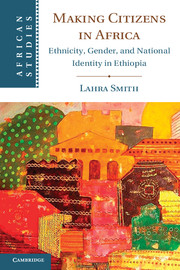Book contents
- Frontmatter
- Contents
- Maps and Tables
- Acknowledgments
- Abbreviations
- Glossary
- Maps
- Introduction
- The Challenge
- The Response
- 3 Popular Responses to Unequal Citizenship
- 4 A Referendum on Ethnic Identity and the Claims of Citizenship
- 5 No Going Back on Self-Determination for the Oromo
- 6 Ethiopian Women and Citizenship Rights Deferred
- Conclusion
- Appendix I Methodology
- Appendix II Questionnaire for Parents and Community Members (English)
- Appendix III Questionnaire for School Directors
- Appendix IV Questionnaire for Teachers
- Bibliography
- Index
5 - No Going Back on Self-Determination for the Oromo
Published online by Cambridge University Press: 05 May 2013
- Frontmatter
- Contents
- Maps and Tables
- Acknowledgments
- Abbreviations
- Glossary
- Maps
- Introduction
- The Challenge
- The Response
- 3 Popular Responses to Unequal Citizenship
- 4 A Referendum on Ethnic Identity and the Claims of Citizenship
- 5 No Going Back on Self-Determination for the Oromo
- 6 Ethiopian Women and Citizenship Rights Deferred
- Conclusion
- Appendix I Methodology
- Appendix II Questionnaire for Parents and Community Members (English)
- Appendix III Questionnaire for School Directors
- Appendix IV Questionnaire for Teachers
- Bibliography
- Index
Summary
Perhaps no other ethnolinguistic group’s experience better illustrates the complex and contested realities of ethnic politics in the modern Ethiopian state than that of the Oromo people. Although the largest ethnic group in terms of population size, they have been understudied historically and their people subjected to intense political and social pressures for assimilation and acculturation. Recent scholarship on the Oromo people has enabled a fuller discussion on their place in regional history. This includes study of the internal social and political dynamics that led to the formation of an “Oromo people,” the various subclan groupings that constitute the Oromo, and, particularly, their historical relationship to both the historic highland empire and the modern Ethiopian state. Considerably less, however, has been written about the implications of contemporary political processes on Oromo identity and, especially, about the accomplishments and limitations of citizenship expansion for members of the Oromo ethnic community.
In particular, the study of the Oromo question in Ethiopia today demonstrates that on matters of identity politics and citizenship, there can be no turning back on strides made in citizen creation and meaningful citizenship for members of ethnocultural communities. Although there are vocal challenges made by those opposed to federalism, these are often veiled attempts to return to an assimilationist or structurally Amhara-dominant political system; it is nearly impossible to imagine such an outcome. This is in large part because of the tremendous impetus to regional self-determination provided by the Oromos’ embrace and successful implementation of reforms in this direction.
- Type
- Chapter
- Information
- Making Citizens in AfricaEthnicity, Gender, and National Identity in Ethiopia, pp. 139 - 168Publisher: Cambridge University PressPrint publication year: 2013



